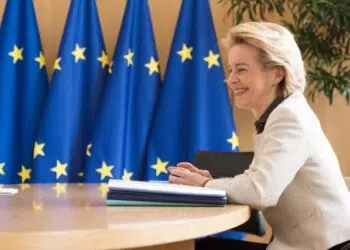Brussels – “It’s a bit noisy outside, I think it’s fair.” It is from her Germany, shaken by farmers’ protests, that the president of the European Commission, Ursula von der Leyen, is relaunching the strategic dialogue with the sector, which is expected to formally start in January.
“I understand many of the concerns of our farmers, they have good arguments on their side. They are concerned with food security, they want a fair income, and they need planning security for their work,” said the German leader in her speech at the Stade Chamber of Commerce New Year’s Eve reception, in Germany. “That’s why,” she added, “about a third of the entire European budget is reserved for payments to agriculture.”
Thousands of farmers have taken to the streets with their tractors in recent days, paralyzing traffic in various regions of Germany. A protest against the Olaf Scholz government’s clampdown on subsidies to the sector. “Our farmers are under great pressure to change,” the German leader admitted, assuring that the European Commission is “initiating a strategic dialogue with the agricultural sector and the entire supply chain.” No specific date yet.
The strategic dialogue to put farmers back at the center of the transition was announced in September at the State of the Union Address and confirmed in December by von der Leyen, who indicatively pointed to January for its launch. With the departure of former Vice President Frans Timmermans, the European Commission has launched a new phase of the Green Deal, one that is more attentive to the realities of industry and farmers, who in recent months have voiced their displeasure with some of the key pillars of Europe’s green growth strategy. And their dissatisfaction soon became a political banner of the European People’s Party (EPP) ahead of the upcoming June elections. The group, and the European center-right in general, first targeted the proposed Nature Restoration Law, accusing it of threatening agricultural production and thus food security at such a sensitive time of Russia’s war in Ukraine. And then, it helped scuttle the reduction in pesticide use proposal, which will now slide directly to the next legislature.
In addition to the legislative impasse on some of the key pillars of the Green Deal, the most obvious consequence is that, especially in the run-up to the June 2024 elections, the European Commission has begun to talk and engage more directly with representatives of the agribusiness and industry sectors. The first energy transition dialogues dedicated to hydrogen and the energy-intensive industry have already been launched in recent weeks.
Few details yet, but the dialogues should serve to strike the right balance between food security goals and farmers’ income, while not losing sight of the green transition goals that must also involve the industry (since more than 10 percent of emissions come from there).
English version by the Translation Service of Withub






